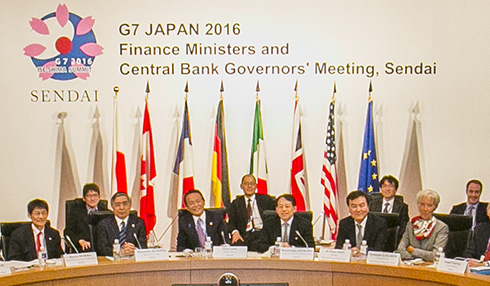The and participated in the G7 Finance Ministers and Central Bank Governors' meeting in Sendai, Japan on Saturday 21 May. The discussion covered money laundering and terrorist financing, including the importance of transparency of beneficial ownership for tax as well as crime and terrorism. Following the meeting, the G7 published an action plan on combatting the financing of terrorism. Through the G7 action plan, which acknowledges FATF’s decisive role in tackling terrorist financing, the G7 countries have committed to lead on actions such as enhanced information exchange and cooperation, and implementation of terrorist asset freezing measures.
The G7 created the FATF in 1989 to tackle money laundering. As of today, 198 jurisdictions have committed at the highest level to fully implement the FATF Recommendations on money laundering, terrorist financing and counter proliferation financing. As a result, most countries now have the tools necessary to deprive criminals and terrorists of their funds. In addition to setting the global standard, the FATF researches the methods criminals and terrorists use to launder and raise their funds. FATF was the first international body to assess how effective countries are at combating these threats. Beyond this we review and identify countries with strategic deficiencies that pose a risk to the international financial system. This has proved effective in forcing countries to take action, as it increases the costs of doing business with those countries and deters foreign investment. The FATF has publicly identified 58 countries with such deficiencies. 43 of these have since made the necessary reforms and been de-listed. The latest of these includes Panama, which in the months before the 'Panama Papers', introduced beneficial ownership requirements on their banks and regulation of lawyers, accountants and real estate agents. Iran too is now recognizing the need to shore up and make safe its financial system, and is re-engaging with FATF to do this. However, the challenge today, is no longer the absence of the tools needed to do the job. The challenge today is the effective use of those tools. It is implementation.
|
The FATF will continue to work hard to promote the effective implementation of its global standards on money laundering and terrorist financing, in close partnership with the G7, G20, UN, IMF, World Bank, Egmont Group of Financial Intelligence Units, FSB, OECD and other international bodies.
More on:
G7 Finance Ministers and Central Bank Governors' Meeting, Sendai, Japan, 20-21 May
An effective system to combat money laundering and terrorist financing
Guidance on Transparency and Beneficial Ownership
|

Far right: FATF Executive Secretary David Lewis, fourth from right: FATF President Je-Yoon Shin.
|


 Twitter
Twitter
 Facebook
Facebook
 Instagram
Instagram
 Linkedin
Linkedin
